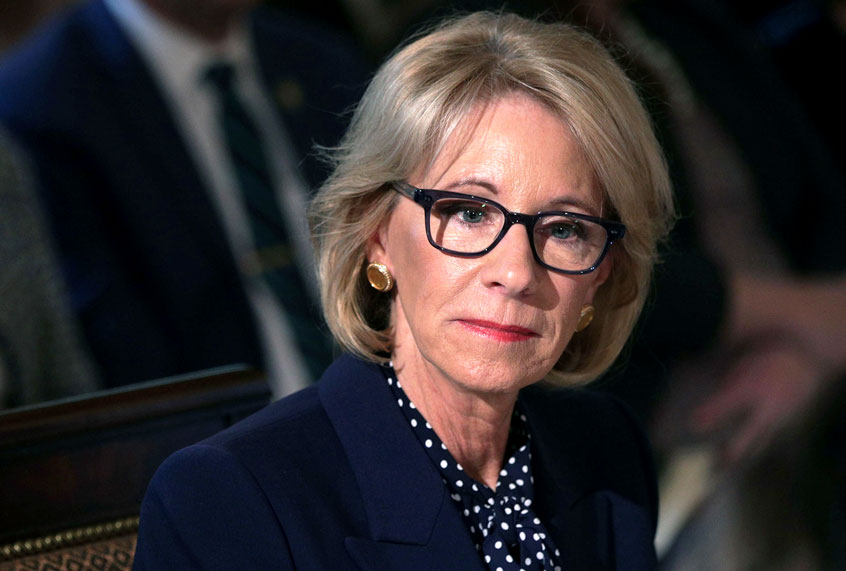Congress created a temporary student loan forgiveness program for public servants but the Department of Education, headed by Secretary Betsy DeVos, has rejected 99 percent of applicants, according to a government watchdog report.
Congress created an expansion program last year after complaints that the existing Public Service Loan Forgiveness (PSLF) program, which provides student debt relief for borrowers in certain public service jobs, failed to help enough people.
A Government Accountability Office report first flagged by NPR and published on Thursday shows that the expansion program has not worked because of the Education Department’s handling of expansion. The report shows that the department rejected 99 percent of applications submitted during the program’s first year.
The Education Department approved just 661 of 54,000 applications it received between May 2018 and May 2019. The department has spent just $27 million of the $700 million Congress allocated for the program.
Though Congress specifically included language in the bill requiring the education secretary to “develop and make available a simple method for borrowers to apply for loan cancellation,” the GAO report found that DeVos did the opposite.
The report found that most applications were rejected because of the “potentially confusing multi-step process” involved. More than 70 percent of applicants were rejected from the Temporary Expanded Public Services Loan Forgiveness (TEPSLF) program because they did not also submit a PSLF application.
“The process can be confusing for borrowers who do not understand why they must apply separately for PSLF — a program they are ineligible for — to be eligible for TEPSLF,” the report said, adding that the Education Department has failed to “improve customer service to borrowers.”
The report also notes that some of the key resources on the Education Department’s website “do not include information” about the new program, including the Help Tool for borrowers, which only lists information about the PSLF program. The department also has not required federal loan service providers to include information about the program.
“Requiring all loan servicers to include TEPSLF information on their websites and including TEPSLF information in its online tool for borrowers would increase the likelihood that borrowers are able to obtain the loan forgiveness for which they may qualify,” the report said.
Melissa Emrey-Arras, who led the GAO review of the program, said she was “disheartened” at what she found.
“I think we were discouraged,” she told NPR. “I mean, the hope is that you have this temporary expanded process, and you want it to help a lot of people. And you don’t want borrowers to be confused about the eligibility criteria and to face a high denial rate. And yet, that’s what we found.”
Education Department press secretary Angela Morabito issued a statement to NPR arguing that the department has “taken steps to help borrowers better understand the complex eligibility requirements, application process, benefits, and other information related to the PSLF and TEPSLF programs.”
Despite insisting that the department was not at fault, Morabito said that the department “agrees with the GAO’s recommendations about how to improve the programs; a number of our efforts are already underway.”
But the report explicitly states that the department “has not created a borrower-friendly TEPSLF process.”
The current system “can be confusing to borrowers,” Emrey-Arras told NPR. “It doesn’t make a lot of sense, from a borrower perspective, as to why you would need to apply for a program that you know you’re ineligible for. Yet that’s the way the process works.”
Rep. Bobby Scott, D-Va., who chairs the House Education Committee, told the outlet he would hold public hearings about the department’s handling of the program, saying it has not been “competently” run.
“The students are entitled to it,” Scott said. “They have fulfilled their responsibility over a decade of public service, and they’re entitled by law to have those loans discharged. … It is the constitutional responsibility of the executive branch to take care that the laws be faithfully executed, and we will focus public attention on the fact that they are not doing it.”
The difficulty in obtaining loan forgiveness funds may not be an oversight. Under DeVos, the Department of Education has repeatedly taken steps to make it harder for student loan borrowers to get relief.
Last month, DeVos set up new rules that make it more difficult for federal student loan borrowers to get debt relief in cases where their colleges had literally defrauded them. Earlier this year, DeVos scrapped Obama-era rules created to protect students from abusive for-profit colleges.
DeVos’ support for predatory lenders and opposition to debt relief has become a focal point in the Democratic presidential primary race. Her recent moves were highlighted in an ad by South Bend, Indiana, Mayor Pete Buttigieg, who — along with his husband — owes $130,000 in student loans, according to the Associated Press. Both Vermont Sen. Bernie Sanders and Massachusetts Sen. Elizabeth Warren have dubbed DeVos the “worst Secretary of Education” in modern history.
“Our students deserve better,” the Democratic Party said in a statement this week, “than a Secretary of Education who continues to side with predatory lenders and make it harder for students to pay back their loans.”


